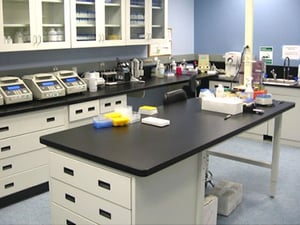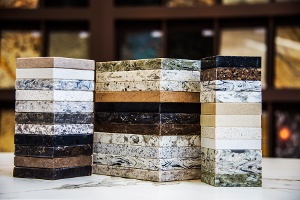The look of your lab sets the tone for how it operates. After all, your employees spend most of their days in the lab space, and the finishing touches you choose can play a role in creating an environment that is professional and aesthetically pleasing.
Solid surface countertops and granite countertops offer a high-end look that is functional, durable and attractive. But, which material is better for your lab?
While every surface, including solid surface countertops vs granite, has its advantages and disadvantages, understanding those characteristics and considering how you'll use the space, can significantly improve your confidence that you made the right choice of countertop material.
Composition Of Solid Surface Countertops Vs Granite
Solid surface countertops are made from human-designed countertop materials. As such, they're non- porous and homogenous, maintaining a consistent look, feel and durability across the top. They are comprised of a combination of natural minerals (66%) with binding resins (33%).
porous and homogenous, maintaining a consistent look, feel and durability across the top. They are comprised of a combination of natural minerals (66%) with binding resins (33%).
These resins can come from acrylic, polyester and plastic. The engineered stone comes from natural stone fragments, such as marble or granite, in addition to a fine white powder called aluminum trihydrate.
When this mixture reaches a high heat of 140 degrees F or higher, it cures and hardens into what we know as solid surface countertops.
Granite is an igneous rock, meaning that it is formed from cooling magma inside the earth's crust or mantle, which the earth then expels through a volcanic eruption or another upward shifting of the surface. The material used to create granite countertops is sourced from special quarries often found in Italy, Brazil and other countries throughout the world.
Granite is made of many minerals, including quartz, amphiboles, feldspar, micas and trace minerals.
Both solid surface and granite are composites of other materials heated and melted together … one by the earth; the other by human ingenuity.
Pros And Cons Of Solid Surface Countertops
Like any countertop material, solid surface countertops have their pros and cons. Both should be weighed when determining whether solid surface is best for your lab.
Pros
- Moisture resistant: Because solid surface countertop is non-porous, moisture doesn't seep into the tiny imperfections found in natural stone.
- Bacteria and mildew resistant: Bacteria and mildew cannot survive on a non-porous surface.
- Stain-resistant: The non-porous feature allows the solid surface to resist stains.
- Invisible seams: Solid surface features invisible seams, making this material a popular choice for aesthetic reasons.
- Durable: The homogeneous nature of solid surface makes it more durable than layered countertops like laminate.
- Easy to maintain: Soap and water are sufficient to keep solid surface countertops clean.
- Repairable: Should a solid surface counter suffer a nick, scratch or gouge, you can sand it out and it looks as good as new.
- Customizable: Get them in a variety of colors and patterns that can even mimic natural stones.
Cons
- Can’t withstand harsh chemicals: Harsh chemicals can damage solid surface countertops, so labs that use chemicals on a regular basis may need to opt for a different material.
- Not heat resistant: Open flames or hot instruments can discolor and damage a solid surface countertop.
- Scratches easily: Sharp tools can scratch and damage solid surface countertops.
- Aesthetics can suffer: Scratches impact aesthetics, but remember, you can sand them out periodically when aesthetics matter.
- Major repairs may need tools you don't have: Major repairs may require a professional with specialized sanding and polishing tools.
Pros And Cons Of Granite Countertops
While granite countertops are often associated with kitchens and bathrooms in homes, they are popular in many laboratories and manufacturing spaces as well. However, like solid surface countertops, they have their disadvantages.
many laboratories and manufacturing spaces as well. However, like solid surface countertops, they have their disadvantages.
Pros
- Sustainability: Granite requires minimal processing. Unlike some other materials like butcher block that are made of wood, granite is relatively endless in places where it's present. Unlike solid surfaces, when it's time to dispose of the granite down the road, you dispose of rock, not plastic resin.
- Heat resistant: Granite countertops do not stain or burn even if you place an Erlenmeyer flask straight off the hotplate.
- Scratch resistant: Granite gets a 7 on the Mohs mineral hardness scale. Only minerals harder than a 7 can scratch it, such as diamond or topaz.
- Resistant to chemicals: Granite countertops are highly chemical-resistant with both acids and bases. However, some chemicals can erode the sealer you use over time.
- Stain resistant: Darker granites are more stain resistant while lighter ones may need sealers to avoid staining.
- 100% natural: Unlike Solid Surface Countertops which are 66% natural rock, granite is 100% natural.
Cons
- Visible seams: The perfect granite slab is hard to come by, so you'll likely have multiple seams on a large lab bench. Because no piece of granite is the same, it can be difficult to perfectly align the mineral pieces. The color can also vary between pieces.
- Repairs: While rare, granite can chip, especially at the corners or around cut-outs made during installation. Only a professional can repair granite.
- Sealing: Granite is porous so it can soak up liquid. Certain liquids can stain it. If this is a concern in your lab, periodic sealing is recommended.
- Harbors microorganisms: If unsealed, granite is porous and can provide hiding places for bacteria and mildew.
- Often imported: The U.S. supply of granite often comes from Brazil, India, China and Canada. If you're in the United States, unless you're getting granite from Canada, this heavy material has to travel a long way, increasing your delivery costs and contributing to your carbon footprint.
Cost Of Solid Surface Countertops Vs. Granite
Cost is an important consideration with any long-term investment.
How much do solid surface countertops cost? Solid surface prices range between $50 and $200 per square foot. Special finishes, edging and certain pigments can drive the price up. Prices will also vary by manufacturer.
Granite prices range greatly as well, usually between $50 to $110 per square foot. Color, texture and size, as well as where it's imported from and the manufacturer, can all drive this price.
There are many additional factors to consider when weighing the overall cost of a lab countertop, including the durability of the material and your specific lab requirements. For example, if repairs are frequently needed, this can drive up the lifetime cost of your purchase.
Solid Surface Countertops Vs. Granite As A Lab Surface
So which is better in the battle of solid surface countertops vs. granite? Both can work well. It often boils down to your lab’s specific needs.
For example, solid surface countertops are non-porous, so they can often meet clean room requirements, but they’re not as durable as granite. Therefore, you may need to repair scratches to maintain their clean room properties. Granite's heat resistance is a major plus in a lab. It stands up to wear and tear, but it can be a bigger investment upfront. Granite is also porous, making it a haven for bacteria and mildew, if not properly sealed.
If neither seems like a good fit for your lab space, there are other materials that may be better investments, including phenolic resin and epoxy resin. Both are resistant to many of the harsh conditions found in labs, from chemicals to bacteria and heat exposure.
You can read more about these two options as well as some of your other choices in our article, Top 5 Materials To Consider For Your Lab Countertops.


